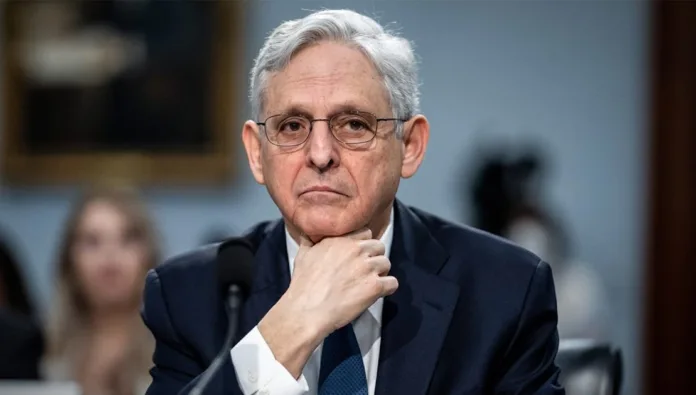House Republicans vote to hold Attorney General Garland in contempt over refusal to release interview tapes from Biden classified documents probe
Attorney General Merrick Garland faced a significant rebuke on Wednesday as the US House of Representatives voted to hold him in contempt of Congress. The vote, which passed with a 216-207 majority, saw only one Republican join the Democrats in opposing the resolution. This decision arose from Garland’s refusal to hand over interview tapes from a Justice Department investigation into President Joe Biden’s handling of classified documents.
Garland responded to the vote by accusing House Republicans of using congressional authority as a partisan tool. He emphasized that the vote ignored the constitutional separation of powers and the Justice Department’s need to protect its investigations, highlighting the extensive information already provided to the committees.
Garland now joins a short list of only three attorneys general and four sitting cabinet members in US history to be held in contempt of Congress. The contempt resolution calls for the Justice Department to decide on potential criminal prosecution against Garland. However, it is unlikely that a Justice Department prosecutor would pursue charges against their own head.
This vote is reminiscent of previous partisan contempt votes against Attorneys General William Barr and Eric Holder, who also faced no criminal charges. House Speaker Mike Johnson described the vote as crucial for maintaining the integrity of congressional oversight.
Moderate Republican David Joyce was the sole member of his party to vote against the resolution, citing his belief that it further politicizes the judicial system. All 206 Democrats present also opposed the resolution.
The contempt vote follows a year-long investigation by Special Counsel Robert Hur into Biden’s retention of classified documents post-vice presidency. Hur concluded that no criminal charges were warranted, despite Biden’s apparent willful retention of the materials. He noted that securing a conviction would be challenging, given Biden’s status as an elderly man with memory issues.
The investigation’s findings, which included Biden’s inability to recall certain events during a five-hour interview, have intensified concerns about his age and cognitive abilities amidst his re-election campaign. Biden’s lawyers disputed these characterizations, calling them prejudicial.
In March, Garland provided a full transcript of Biden’s interview to congressional Republicans but resisted subpoenas for the audio recordings. Citing executive privilege, Biden blocked access to these tapes, with Garland arguing that releasing them could deter future cooperation with the Justice Department.
Last week, Garland condemned the contempt measure as part of a broader pattern of attacks on his agency, primarily focused on accusations that the Biden administration has weaponized the Justice Department against political opponents. Despite this, Garland’s department has also prosecuted Biden’s son, Hunter, and two Democratic congress members.
In a Washington Post opinion piece, Garland highlighted the unprecedented attacks on the Justice Department, attributing them to rising conspiracy theories, falsehoods, and threats of violence from Republican critics. He warned that the short-term political gains from such tactics could have long-term detrimental effects on the country.
Analysis:
Political: The contempt vote against Merrick Garland reflects deepening political divisions in the US, with Republicans accusing the Justice Department of bias and weaponization under the Biden administration. This move underscores the ongoing struggle between the executive and legislative branches over oversight and transparency.
Social: Public reaction to the vote and the investigation into Biden’s handling of classified documents is likely to further polarize American society. The incident adds to the ongoing debates about accountability, transparency, and the integrity of public officials, influencing public trust in government institutions.
Racial: Although the specific incident does not directly involve racial issues, the broader context of distrust in government and law enforcement agencies can disproportionately affect marginalized communities. Historical and ongoing disparities in the justice system may amplify concerns about fairness and equity in political processes.
Gender: The political turmoil and the handling of high-profile investigations can have nuanced gender implications. For instance, female political figures and legal professionals may face heightened scrutiny and different expectations compared to their male counterparts, influencing perceptions of their roles and effectiveness.
Economical: The political instability and conflicts resulting from such high-stakes investigations and contempt votes can have indirect economic consequences. Market confidence can be affected by perceived governmental dysfunction, and prolonged partisan battles may divert attention and resources from critical economic issues.
